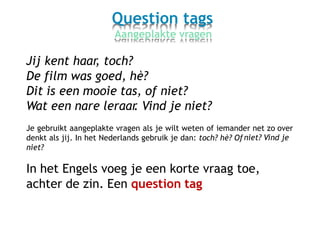
Questiontags
- 1. Question tags Aangeplakte vragen Jij kent haar, toch? De film was goed, hè? Dit is een mooie tas, of niet? Wat een nare leraar. Vind je niet? Je gebruikt aangeplakte vragen als je wilt weten of iemand denkt als jij. In het Nederlands gebruik je dan: toch? hè? Of niet? er net zo over niet? Vind je In het Engels voeg je een korte vraag toe, achter de zin. Een question tag
- 2. Question tags Aangeplakte vragen The doctor is really nice, isn’t he? We are good friends, aren’t we? These buildings are empty, aren’t they? Dus… Als de zin positief is, is de tag negatief. She isn’t really nice, is she? He can’t drive, can he? You haven’t got my book, have you? Dus… Als de zin negatief is, is de tag positief.
- 3. Question tags Aangeplakte vragen Net zoals bij vragen en ontkenningen heb je bij to be en alle hulpwerkwoorden geen ‘to do’ nodig als je de tag toevoegt. The tower isn’t really haunted, is it? You have got a car, haven’t you? She should give it a try, shouldn’t she? Bij de hoofdwerkwoorden gebruik je ‘to do’ in je aangeplakte do/don’t of does/doesn’t vraag je: You like to play guitar, don’t you? She drives a minivan, doesn’t she? They don’t go to school, do they?
- 4. Question tags Aangeplakte vragen Exercise: fill in the missing ‘tags’. 1. 2. 3. 4. 5. 6. 7. 8. 9. You really don’t like him, ............? This hamburger looks good, ............? He is your friend, ............? She walks all the way home, ............? We aren’t always late, ............? You hate my brother, ............? You play football in college, ............? That music sounds great, ............? Fred cannot sit still, ............?
- 5. Question tags Aangeplakte vragen Exercise: fill in the missing ‘tags’. 1. 2. 3. 4. 5. 6. 7. 8. 9. You really don’t like him, do you? This hamburger looks good, doesn’t it? He is your friend, isn’t he? She walks all the way home, doesn’t she? We aren’t always late, are we? You hate my brother, don’t you? You play football in college, don’t you? That music sounds great, doesn’t it? Fred cannot sit still, can he?